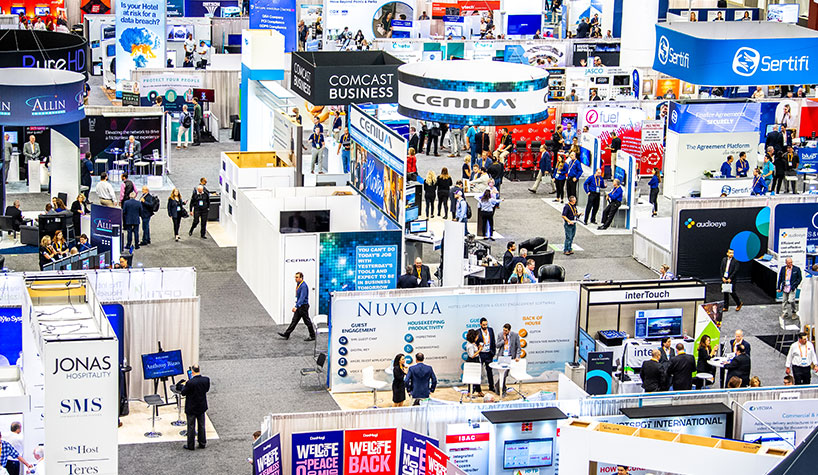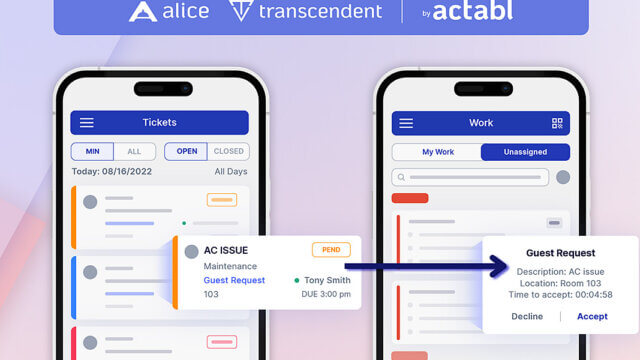MINNEAPOLIS—Go to a technology conference and you’re usually wowed by the latest and greatest innovations—new platforms and products that aim to deliver on the promises made by The Jetsons all those years ago. At this year’s HITEC, there was plenty of innovation—voice-enabled devices, robots, systems made better with the use of artificial intelligence, etc.—but a common theme you heard from vendors when walking among the booths was that the focus wasn’t on the sexy new product; instead, the messaging many of them wanted to convey was that their technology would simply work for hoteliers and guests, and would make their lives easier. Simplicity and functionality were the theme on the trade show floor.
“A lot of what we’re trying to show here this year is not necessarily just a new flashy gizmo, but really purposeful innovation,” said Garry Wicka, U.S. vice president of marketing for LG Business Solutions. “The reason I highlight that is most of what you see here is driven by our customers, our partners, our integrators, our CMS partners who say, ‘Hey, we really want to do this? Is this possible?’ Then we put the time in and help develop it versus, ‘Hey, we have this; now you need to buy it.’”
For its part, among other innovations, Aptech Computer Systems was showcasing its mobile accounting tool. VP Jill Wilder noted that the driving force behind the enhancement was to make the functionality more seamless for its users. “Any of the functionality you can do inside the accounting tool, you can also do on a mobile device,” she said. “It looks exactly the same, resizes itself. We had a customer who said that he was sitting in the dentist’s office, waiting for his appointment, approving invoices. That’s about as real as it is. It’s hard to put sizzle and flair into an accounting app, because accounting has to work, it has to be right, but… the sizzle is having that ability to do whatever you want to do.”
Wilder added that creating more seamless, functional systems is important because more sophisticated enhancements are coming, and they need a good foundation to work off of. “The fancy stuff is coming—predictive analysis and AI, that’s soon to come,” she said. “Let’s streamline what we have right now and get ready… I predict next year we’ll see some pretty highly sophisticated things come out.”
Patrick Bosworth, CEO and co-founder of Duetto, said that this drive toward simplicity wasn’t just something the company was showing at HITEC—it was part of an overall evolution of the company’s outlook. “What was eye opening was you go out and talk to customers and they mention things like revenue lift or increased profit, but they spend 95% of their time talking about their daily lives, the tasks they’re working on and how they want to make progress at becoming more efficient, having more control and having more peace of mind—and being able to have a life,” he said. “We used to state our mission as helping maximize RevPAR and profitability of hotels, and now our mission statement is around improving the lives of hoteliers. That’s a very different range of things you could consider doing if your mission is around improving the lives of hoteliers.”
He continued, “Many of the things we touch that affect the way you budget for a hotel, affect the way you respond to group quotations in your group sales department; all of these things are the sort of subtle ways you run the business day to day. There are really important ways we can just make that more effective, make it faster, improve the quality of decisions, that maybe aren’t as glitzy in terms of headlines of the next wave of one to one personalization and pricing in the industry, but actually have a greater impact.”
Vanessa Ogle, founder and CEO, Enseo, echoed this point. “When we launch a platform, how do we make it beneficial to each one of the constituents? Something great for guests, something great for employees, something great for owners, so there’s benefits for everyone,” she said, noting that most hotels don’t have the budget to buy everything new. As such, when the company launched Fido, which is the complete architecture for managing smart devices in guestrooms, it made sure it was as functional as possible, compatible with other equipment. “With Fido, what we’re seeing is hotels have already spent a lot of money on technologies. We’re not the company that says they should start over. Fido is being able to use the technology that’s already in the room so a hotel doesn’t have to go spend $1,000 on custom equipment going in. They can use any industry standard piece of equipment and combine them together, but to the guest, it’s one experience.”
Technology that enabled hotels to use preexisting products were all over the show floor at HITEC. For instance, Dormakaba was showing its RT Plus mobile-enabled RFID guestroom electronic door lock, which has BLE (Bluetooth Low Energy) technology integrated in its reader and is ideal for magstripe or mechanical lock retrofit. David Ginn, Dormakaba VP of hospitality sales, North America, noted, “Many properties are wanting that upgrade, but they really don’t need to change the hardware. That’s still good for 25 years. The RT Plus is designed to where if you have those series locks, all we have to do is sell you one piece. They unscrew the old lock, use the same screws and put this lock on and reprogram it. They can upgrade their locks and get the latest technology, and they don’t have to even pay us to come install it.”
As another example, Jodi Deros, co-founder of Cirq, noted that its platform had a modular construction—enabling hotels to keep up with changes in technology. “How many rooms have you gone into where there’s a speaker radio with the 30 pin?” she asked. “They spent thousands on those, and they were obsolete in a minute because they didn’t have the ability to change out that prong. We understood that and built it so all of these modules can swap out with updated modules. You don’t have to throw the whole system out. It’s a quick change on our part, and you’re up and running and state of the art with one module change. And it’s very cost effective to change that.”
Emergency Alerts
While much of the focus at HITEC was on simplifying technology, there was one product type that was being shown more than it ever has before—panic button technology. This isn’t surprising given the five-star promise made last year by the AHLA and multiple hotel brands to provide employees across the U.S. with employee-safety devices by 2020.
Enseo’s Ogle, whose company featured its MadeSafe program in its booth, added, “The AHLA five-star promise is so exciting, and HTNG has done a great job of coming up with some technical standards for recommendations, which we and a lot of the other vendors worked together with to give the industry some guidelines on what to look for.”
And at HITEC, the industry featured those solutions. Indeed, TraknProtect, provider of real-time location technology purpose-built for the hospitality environment, claimed the Judges’ Choice Award in this year’s Entrepreneur 20X (E20X) competition. Tim Hansen, TraknProtect’s CTO, said that this is being driven by what the industry wants. “With a lot of the brand mandates that are coming down, the owners are definitely being driven to find a solution,” he said.
The key is to have a solution that works seamlessly. “This is one of those technologies where hopefully no one ever uses it, but if it does get used, it has to work,” he said. “From a technology standpoint, there’s a lot of redundancy built into it. For example, our Bluetooth hubs that create the coverage throughout the property, there’s always overlapping coverage, so if one’s offline or something is broken, there’s redundancy.”
TraknProtect, Allbridge and Ruckus Networks revealed a partnership at HITEC. Allbridge manages the new employee-safety devices using the Ruckus Networks’ IoT Suite. “TraknProtect has its system, which has native beacons that can be put in place, but then they’ve also partnered with Ruckus so you can write it all on a Ruckus network; the BLE beacon is built into the access point, the button themselves is a small form factor and they just work,” said Matt Koch, chief product officer, noting that a 200-room hotel installed the system in 2.5 days. “It comes with an app, so if you’re a responder you’ll get a push notification to your mobile device, you can have it on the front desk PCs or if you have a security office, obviously you’d want to have it there. And even as they move around the property, you’ll see that person move down that hallway.”
For their part, Bittel and Alice also showcased an integrated solution. “We’ve always had customers asking us about panic buttons, and we’d tell them we’re a software player. It’s not really a panic button if you have to log in,” said Alice co-founder and President Alexander Shashou. “What we’ve looked for in the industry is providers who can provide hardware that can run software so that the hotel only needs to buy one device… Then, once that’s enabled, we’ll be able to do smart things with the software, such as when a panic button is pressed, we’ll be able to alert all staff in the hotel to be on high alert, as well as safety announcements—maybe it’s not a panic button per se, but just a safety instruction so that people know a VIP has walked in the door or is a security threat.”

